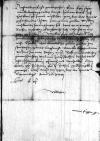Ich hab Ewrn G(nade)n zuvor auff den XIIII tag dits monats cf. [Anton FUGGER] to Ioannes DANTISCUS Augsburg, 1531-11-14, CIDTC IDL 5855⌊geschribencf. [Anton FUGGER] to Ioannes DANTISCUS Augsburg, 1531-11-14, CIDTC IDL 5855⌋, das ich von herrn Quirinus Galler (†1543), a merchant from Passau and the Fuggers' agent in Rome; scribe of the Roman Rota and notary of the Roman Curia (RC, No. 443, 479, 485; NOVA 1981, p. 355-372 )⌊Quirino GallerQuirinus Galler (†1543), a merchant from Passau and the Fuggers' agent in Rome; scribe of the Roman Rota and notary of the Roman Curia (RC, No. 443, 479, 485; NOVA 1981, p. 355-372 )⌋ von Rome (Roma), city in central Italy, on the Tiber river, seat of the Holy See⌊RomRome (Roma), city in central Italy, on the Tiber river, seat of the Holy See⌋ noch kain wissen empfangen het, / was er in Ewr G(nade)n sachen ausgeben od(er) ausgericht hete. / Also hat Quirinus Galler (†1543), a merchant from Passau and the Fuggers' agent in Rome; scribe of the Roman Rota and notary of the Roman Curia (RC, No. 443, 479, 485; NOVA 1981, p. 355-372 )⌊erQuirinus Galler (†1543), a merchant from Passau and the Fuggers' agent in Rome; scribe of the Roman Rota and notary of the Roman Curia (RC, No. 443, 479, 485; NOVA 1981, p. 355-372 )⌋ mir yetzo geschriben, / wie E(uer) F(urstlich) G(nade)n abzuligenden copi zuvernemen haben. Dabey will ich dannocht Ewrn G(nade)n nicht erzallen, / das bemelter her Quirinus Galler (†1543), a merchant from Passau and the Fuggers' agent in Rome; scribe of the Roman Rota and notary of the Roman Curia (RC, No. 443, 479, 485; NOVA 1981, p. 355-372 )⌊Quirino GallerQuirinus Galler (†1543), a merchant from Passau and the Fuggers' agent in Rome; scribe of the Roman Rota and notary of the Roman Curia (RC, No. 443, 479, 485; NOVA 1981, p. 355-372 )⌋ inn sein sachen etwas langsam ist, damiths begegnet mir von ime inn mein sachen auch. / So er nun die sachen gar außrichten und mir zu wissen thun wirdet, will ichs alßdann Ewrn G(nade)n auch nit verhalten. / Dann Ewrn G(nade)n zu dienen bin ich zu thuen und(er)thanigklich genaigt. /


 AAWO, AB, D.90, f. 79v
AAWO, AB, D.90, f. 79v